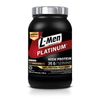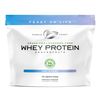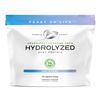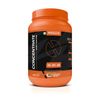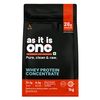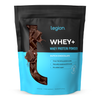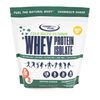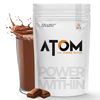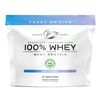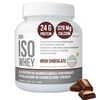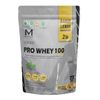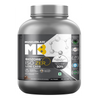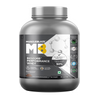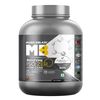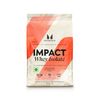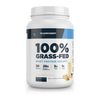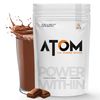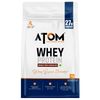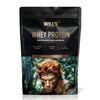PROTEIN GUIDE
What is Whey Protein? (The 101)
Whey is a protein found in dairy products. Whey Protein is a byproduct of the cheese-making process that contains an incredible range of essential amino acids, which are absorbed quickly by our body.
What is Whey Protein good for?
Research on the use of whey protein shows gains in:
- Exercise training. Whey protein might help speed muscle recovery after intense exercise. Some evidence suggests that taking whey protein as part of a strength training program increases strength and muscle mass.
- Wound healing. Whey protein contains high levels of amino acids that are important for wound healing. It might be a good strategy for people with chronic wounds or for those recovering from burns.
- Malnutrition. Whey protein might help those who have trouble gaining weight.
Is Whey Protein safe?
Whey protein appears to be safe when taken in appropriate amounts. Don't use whey protein if you’re allergic to dairy products.
Can pregnant women take Whey Protein?
Depending on total body weight, pregnant women need to eat about 70 to 100 grams of protein a day.
If you’re pregnant and you’re having a hard time meeting your protein intake goal you may want to use a supplement, with the approval of your OB. Look for a pure whey protein powder that has passed our heavy metal tests.
Is Whey Protein Safe for Children?
Most of the time, children get enough protein from a balanced diet. Giving them protein supplements when not needed might prevent children from developing healthy eating behaviors.
When a child cannot eat a balanced diet or absorb nutrients properly, protein supplementation may be helpful, with the approval of the doctor. In those cases, look for a protein powder that is pure, with few ingredients and no added sugar.
Keep in mind that too much protein can bring negative effects, such as diarrhea, bloating and problems with absorbing other nutrients.
Is Whey Protein Vegan?
No. It’s a byproduct of the cheese-making process, therefore it comes from milk.
Is there a vegan substitute for whey protein?
Yes, there are many.
Manufacturers can remove most of the fat and carbs from plant foods and isolate their protein to make protein-rich powders.
Common vegan protein powders are pea, hemp, brown rice, pumpkin seed, soy, quinoa and chia. To get an ideal amino acid profile choose a product made of a blend of complementary vegetable proteins.
How much protein do you need?
The DRI (Dietary Reference Intake) is 0.8 grams per kg of body weight for an average sedentary adult considering the protein from food plus the protein from supplements.
For people of ages 40–50, the protein needs increase to 1–1.2 grams per kg.
People who exercise regularly need about 1.1–1.5 grams per kg.
People who exercise more intensely need 1.2–1.7 grams per kg.
If you are overweight, your protein intake should be calculated by a dietitian.
When should I take my whey protein?
This topic polarizes opinions. Overall studies find that total protein intake is the strongest predictor of muscle strength and size, regardless of whether you consume it close to exercise.
It means that HOW MUCH protein you consume per day is likely more important than WHEN you consume it for gaining muscle size and strength.
On the other hand, if your goal is to lose weight, research suggests increasing the ingestion of protein in the morning might have a positive effect on the appetite and cravings control during the rest of the day.
How to store my whey protein?
Keeping your protein powder fresh requires proper storage. Most brands design their packaging with optimum conservation in mind, so all you have to do is to seal it well and to keep it in a cool, dark and dry environment.
Labdoor is not a medical source. Don’t take supplements before talking to your physician.
SOURCES
Protein and Amino Acid Requirements during Pregnancy
Daily nutritional goals for age-sex groups based on dietary reference intakes and Dietary Guidelines recommendations. (n.d.).
International society of sports nutrition position stand: nutrient timing
Protein timing has no effect on lean mass, strength and functional capacity gains induced by resistance exercise in postmenopausal women: A randomized clinical trial
Protein Considerations for Optimising Skeletal Muscle Mass in Healthy Young and Older Adults Dietary Guidelines for Americans, 2020-2025
 L-Men - Platinum
Expired
L-Men - Platinum
Expired
 Muscle Feast Whey Protein Concentrate
Muscle Feast Whey Protein Concentrate
 Muscle Feast Whey Protein Hydrolyzed
Muscle Feast Whey Protein Hydrolyzed
 Bal Bharat Concentrate Whey Protein
Bal Bharat Concentrate Whey Protein
 AS-IT-IS Nutrition Whey Protein Concentrate
AS-IT-IS Nutrition Whey Protein Concentrate
 Legion Whey+ Protein Powder
Legion Whey+ Protein Powder
 Power Play Fuel Cold Micro Filtered Whey Protein Isolate
Power Play Fuel Cold Micro Filtered Whey Protein Isolate
 AS-IT-IS Atom PWR Whey Protein
AS-IT-IS Atom PWR Whey Protein
 Muscle Feast 100% Whey
Muscle Feast 100% Whey
 Muscle Feast Hormone Free Grass Fed Whey Isolate
Muscle Feast Hormone Free Grass Fed Whey Isolate
 Bon Iso Whey 100% Protein Isolate - Irish Chocolate
Bon Iso Whey 100% Protein Isolate - Irish Chocolate
 Muscle First PRO WHEY 100
Expired
Muscle First PRO WHEY 100
Expired
 MuscleBlaze Biozorb Iso Zero
Expired
MuscleBlaze Biozorb Iso Zero
Expired
 MuscleBlaze Biozorb Performance Whey
Expired
MuscleBlaze Biozorb Performance Whey
Expired
 MuscleBlaze Biozyme Iso-Zero Low Carb
Expired
MuscleBlaze Biozyme Iso-Zero Low Carb
Expired
 MuscleBlaze Biozyme Performance Whey
Expired
MuscleBlaze Biozyme Performance Whey
Expired
 Puro IsoPro WPI Whey Isolate
Expired
Puro IsoPro WPI Whey Isolate
Expired
 MyProtein Impact Whey Isolate - India
Expired
MyProtein Impact Whey Isolate - India
Expired
 Transparent Labs 100% Grass-Fed Whey Protein Isolate
Expired
Transparent Labs 100% Grass-Fed Whey Protein Isolate
Expired
 AS-IT-IS ATOM Nitro Whey Protein with Creatine
Upcoming
AS-IT-IS ATOM Nitro Whey Protein with Creatine
Upcoming
 AS-IT-IS ATOM Whey Protein
Upcoming
AS-IT-IS ATOM Whey Protein
Upcoming
 Will's Smart Nutrition Whey Protein
Upcoming
Will's Smart Nutrition Whey Protein
Upcoming

